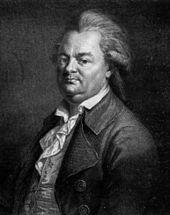
1739 - 1791 Person Name: Ch. F. D. Schubert Hymnal Number: 442 Author of "Alles ist euer! o Worte des ewigen Lebens!" in Gesangbuch der Evangelischen Gemeinschaft Schubart, Christian Friedrich Daniel, son of Johann Jakob Schubart, schoolmaster and assistant clergyman at Obersontheim near Hall, in Württemberg (after 1740, at Aalen), was born at Obersontheim, March 26, 1739, and in 1758 entered the University of Erlangen as a student of theology. Thereafter he was for some time a private tutor at Königsbronn. In 1764 he was appointed organist and schoolmaster at Geisslingen, near Ulm. In 1768 he became organist and music-director at Ludwigsburg; but, in 1772, on account of misconduct, he was deprived of his office. After that, he led for some time a wandering life, and then settled down in Ulm, where he edited a political newspaper, entitled the Deutsche Chronik, with success. By his scurrilous attacks on the clergy, especially on the Eoman Catholics, and in particular upon the Jesuits, and by a satirical poem on the Duke of Württemberg, he made himself obnoxious. Unsuspectingly accepting an invitation to Blaubeuren, he was handed over to the Duke's adjutant, and, on Jan. 23, 1777, was imprisoned in the castle of Hohenasperg, where he remained, without even the shadow of a trial, till May 11, 1787. As a recompense for his long imprisonment, the Duke made him Court and theatre poet at Stuttgart, where he died of fever, Oct. 10, 1791 (Koch, vi. 376; K. H. Jördens's Lexicon deutscher Dichter und Prosaisten, vol. iv. 1809, p. 639).
Schubart was a man of versatile genius, who might have attained distinction in half a dozen lines of life, had he only stuck to any of them. He was a man who could make himself most popular, spite of the fact that he possessed hardly any tact. His moral principles were anything but strong; and the Ten Commandments (especially the seventh) seemed to have little restraining influence over him. As a writer of secular poems, especially of lyrics, he displayed vigour and spirit; but his literary workmanship was often very careless. His hymns, over 130 in all, were written during the two periods when he led an orderly and Christian life, viz., in the years 1764-66, immediately after his marriage, and in the years 1777-87, during his enforced absence from temptation. His captive state, his reading of the devotional books in the commandant's library, and the visits which he then received from P. M. Hahn, pastor at Kornwestheim, awakened in him a repentance, sincere if not altogether lifelong; one of the principal results being the series of hymns included in his so-called Gedichte aus dem Kerker (Zürich, 1785). These were composed at a time when he was deprived of writing materials, and were dictated through a wall to a fellow prisoner in the next cell. They were published without his knowledge or supervision. In self defence he asked the Duke's permission to pubish an authorised edition of his poems; and this appeared at Stuttgart, in 2 vols., 1785-86, as his Sämmtliche Gedicht (a number of copies, printed beyond the subscription, bear the date 1787, and the name of a Frankfurt publisher, e.g. the copy in the British Museum); and this also included most of those in his Todesgesänge, originally published at Ulm in 1767. Being printed at the Ducal print¬ing office at Stuttgart, the poems were subjected to an official revision. Schubart meant to issue a genuine author's edition, but did not live to do so; and that published by his son, as his father's Gedichte, in two parts, at Frankfurt, 1802, is really a selection, and contains only about half of his hymns.
The best of Schubart's hymns are those first published in 1785, which are more genuine and spiritual than his earlier productions. A considerable number became popular, and passed into the Württemberg Gesang-Buch, 1791, and other collections, up to 1850; and a few still con¬tinue in common use. They are, however, too personal and subjective, and not sufficiently natural in style for general use.
Of Schubart's hymns the following have been translated into English, viz.:—
i. Urquell aller Seligkeiten. Supplication for Spiritual Blessings. This fine hymn was written about 1780, and first pub. in his Gedichte aus dem Kerker, Zurich, 1785, p. 102, in 16 stanzas of 4 lines, entitled, "Supplication." The full text is in Koch, 2nd ed., vol. iv., p. 740. Translated as:—
Though by sorrows overtaken. This can hardly be called a translation, but is rather a hymn suggested by the German, and is in 6 st. of 4 1. It appeared in A. R. Reinagle's Collection of Psalm and Hymn Tunes as sung in the Parish Church of St. Peter in the East, Oxford, published at Oxford in 1840, p. 138….
Other hymns by Schubart are:—
ii. Alles ist euer! 0 Worte des ewigen Lebens. Thanksgiving. Translated as, "All things are yours! O sweet message of mercy divine." By Miss Borthwick, in Hymns from the Land of Luther, 1855, p. 5.
iii. Der Trennung Last liegt schwer auf mien. Reunion in Heaven. On the sorrow of parting with friends whom one hopes to meet in heaven. Tr. as, “I die and grieve from those to go." By Dr. G. Walker, 1860, p. 58.
iv, Hier stand ein Mensch! Hier fieler nieder. Sudden death of a Sinne. Translated as, “Now one in health Death, instant, crushes." By Dr. H. Mills, 1845.
v. Kommt heut an eurem Stabe. For the Aged. On the Presentation in the Temple; and founded on St. Luke ii. 22 -32. Tr. as, "Ye who with years are sinking." By Dr. H. Mills, 1845 (1856, p. 275).
[Rev. James Mearns, M.A.]
--Excerpts from John Julian, Dictionary of Hymnology (1907)
Christian Friedrich Daniel Schubart
